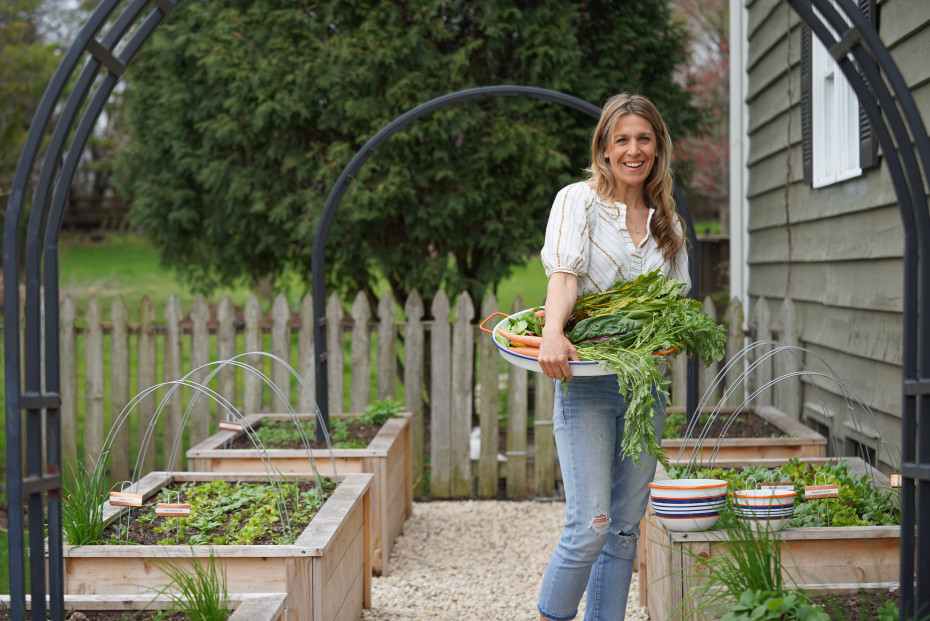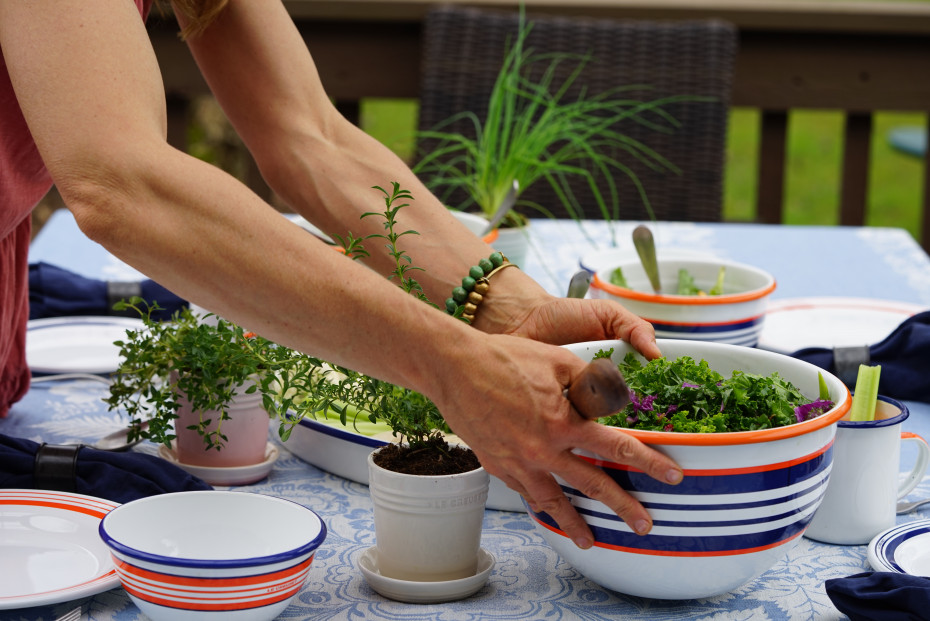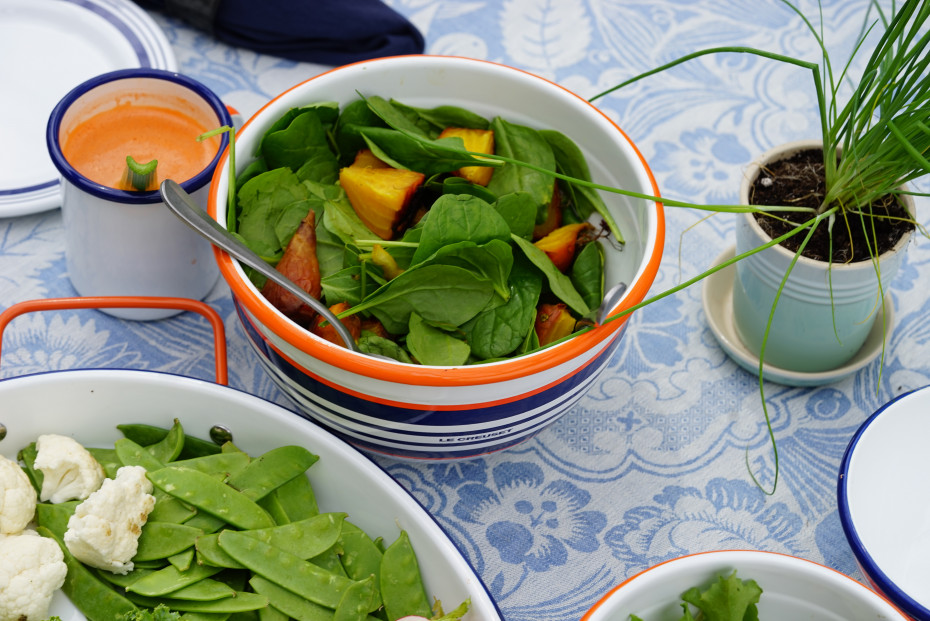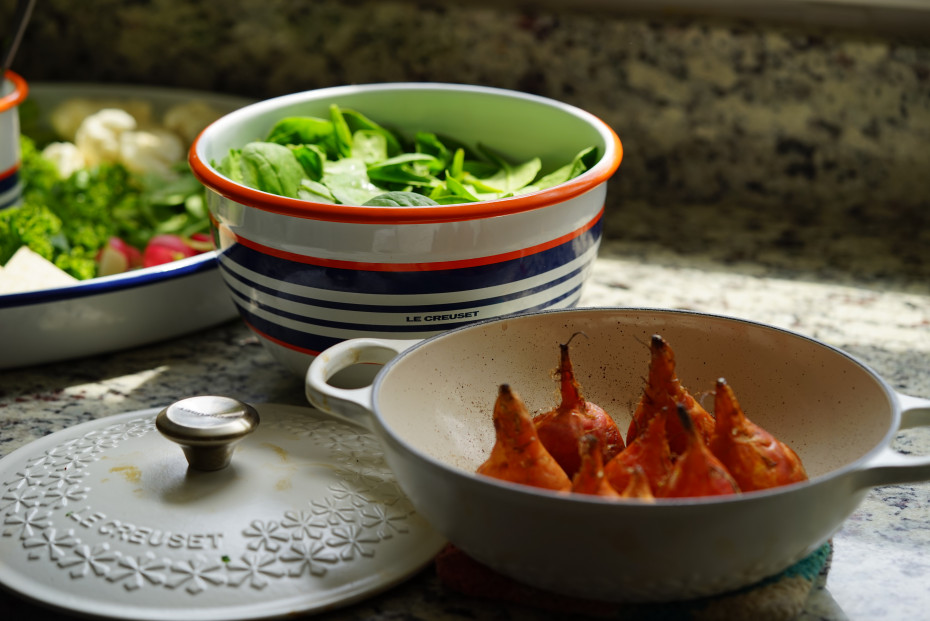When talking about the kitchen garden, I often get asked: "Nicole, what do you do with all that food you're growing?" (I guess the rumor around the internet is that I'm not the best cook).
I think the assumption when someone has a kitchen garden is that they're always in the kitchen—canning, preserving, and cooking. But, for me, the opposite is really true.
I pretty much cook just enough to justify my kitchen garden, rather than the other way around.
Don't get me wrong—I love sitting down to a delicious meal. But, when given the choice, I'll always choose more time outside playing with my plants.
So, every week, you can find me creating quick and easy recipes inside the kitchen to make the most of what's growing in the kitchen garden. I really like it this way and hope to dispel the rumor that gardening = loads of cooking and preserving.
Instead, having a kitchen garden can really open up the possibilities for delicious, quick, and simple meals that are more tasty than the complicated ones—because the ingredients were just picked.
So, when Le Creuset reached out and asked if I'd create some kitchen-garden-to-table recipes using their beautiful new everyday enamelware, I was more than happy to.
What do I do with all that I pull from the garden?
You'll find out.
I'll share recipes from my own kitchen garden using their super practical and durable everyday enamelware to inspire you to plant more, harvest more, and create more delicious food from your own kitchen garden this summer.
Years ago, I learned from Alice Waters, that it's the source of the food that makes it delicious.
So, hang out with me here and learn how to create some of the most fresh and delicious recipes in your own kitchen from the best source ever: your own kitchen garden.
Many thanks to Le Creuset for being part of the kitchen garden revival and for creating so many amazing products that make me actually want to step in from the garden for a minute and actually cook (a feat in itself).
Whether it's in the kitchen garden or in the kitchen, I'm a firm believer in owning a few items that are so high quality I'll be able to hand them down to my children, rather than a lot of items that will only last a season or two. And Le Creuset definitely gets that value.
So, pull up a seat and be inspired this week to make something delicious yourself and possibly even be okay with stepping inside from the kitchen garden long enough to fill up on the good stuff.
Let's start with a line from the Harvest chapter in my new book, Kitchen Garden Revival:
"If it's delicious to start, you don't need much to make it better, just enhance what's already there."
Whether we love or hate cooking, the fact is that we all eat. Harvesting and preparing food from the kitchen garden is one of the most satisfying and fulfilling ways to do this thing we call "meal time."
A concept I teach to my garden students and that you’ll learn inside my new book, Kitchen Garden Revival, is to categorize food plants within their plant families.
When I first started gardening, the plant shop and the seed racks were so overwhelming. It seemed like there were 1,000 different plants I’d need to learn and understand before I could have success in the kitchen garden.
But over time, I realized that most of our food plants belong in just a few plant families. And just like people families, plant families can tell us a lot about the characteristics of all the plants inside. There’s always that one family member that’s a little "different" (if you know what I mean). But for the most part, the common traits inside a plant family keep showing up.
Lucky for us as kitchen gardeners, instead of needing to understand 1,000 plants, we can just learn about 10 plant families and really begin to get a grasp on what, when, and how to plant each season.
Most plants inside a plant family have similar growing needs in terms of space, time, and season. This means that most of one plant family’s plants will all be planted and harvested around the same time. For instance, peppers, tomatoes, eggplants and potatoes are all in the same Solanaceae family and they all like warmer weather, need at least a foot of space in the garden, and take at least 60 days to produce a harvest.
Plant families don’t just help me make sense of my kitchen garden but also help me in my actual kitchen. The idea of creating dishes around particular plant families not only makes sense but also ensures I’m truly eating seasonally as I focus on the plant families that grow in each particular time of year.
At the time of this writing, we’re in the middle of the Cool Season in the Chicago area. During this season, the Brassica, Amaranth, Aster, and Apiaceae plant families are all growing. (Don’t worry, I’ll use English to describe these families in a second).
So, the dishes you'll see this week here are all inspired by the Cool Season and what’s local and seasonal to me at the moment.
For my Rooted Garden clients in Houston this month, they’re nearing the end of their Warm Season. Their seasonal meals this month look quite different, as they’ve got beans from the Fabaceae family, cherry tomatoes from the Solanaceae family, and cucumbers from the Cucurbitaceae family to enjoy.
In my book, Kitchen Garden Revival, you’ll learn how to identify which season you’re in each month, so you can know which foods to plant and enjoy in your kitchen garden but also so you can choose seasonal and local foods to prepare and eat each month too.


Shop the Le Creuset Enamelware Line
This line is perfect for going kitchen garden to table
One of my favorite plant families in the kitchen garden is the Amaranth family. This includes superfoods like swiss chard, spinach, and beets.
So, let's begin with a delicious salad created from the Amaranth family, which thrives in spring and doesn't mind cool weather one bit.
Amaranth Family Salad
The Amaranthaceae family is one of my favorites in the kitchen garden, particularly because of the lovely swiss chard. The Amaranth family is full of superfoods like spinach, beets, and swiss chard. So, I created a salad that incorporates all of these into one dish.
One thing I love about growing my own foods is that I get to enjoy all parts of each plant. Swiss chard is almost two different vegetables in one: the stems slice and add crunch like celery and the leaves are more succulent like spinach. With beets, you can enjoy the sweet roots but also the crunch of the stems and the softness of the leaves.
This Amaranth Salad uses spinach and swiss chard leaves as the base, the crunch of swiss chard and beet stems to add texture, and the sweetness of roasted beets to make the salad feel more like a meal than just a salad.
Amaranth Family Salad Ingredients
- Fresh spinach from the garden
- Swiss chard leaves and stems
- Fresh beets with greens still attached
- Grapeseed oil
- Sea salt
- Balsamic vinegar
- EVOO
To make:
Use as many ingredients fresh from the kitchen garden as possible.
Spinach is one of the earliest crops you can harvest from the kitchen garden, and you can source beets and swiss chard from nearby farmers if yours hasn't had a chance to take off yet.
This is a dish you can serve all spring long and well into the early parts of summer as your beets and swiss chard really start to thrive. If it gets too warm for your spinach plants, replace the majority of your greens with baby swiss chard leaves.
Step ONE
Harvest beets and wash. Cut greens away from roots and chop beet stems.
Coat each beet with grapeseed oil and sea salt and place in a small dutch oven.
Roast beets at 400 degrees for about one hour.
Step TWO
Harvest, wash, and dry fresh garden spinach.
Place freshly washed and dried spinach as the base of your salad.
Step THREE
Harvest and wash swiss chard and finely chop stems and leaves.
Top the salad greens with chopped swiss chard stems and beet stems.


Shop the Le Creuset Enamelware Line
This line is perfect for going kitchen garden to table
Step FOUR
Remove beets from the oven, chop into quarters, and place atop the chard and beet stems.
Step FIVE
Dress the salad lightly with a 50/50 blend of Balsamic vinegar and EVOO.


Shop the Le Creuset Enamelware Line
This line is perfect for going kitchen garden to table
To take this recipe to a whole new level of kitchen-garden-to-table greatness, you could cook some warm quinoa to mix in. Quinoa, believe it or not, is in the Amaranth family too. So, you're still keeping with the plant family theme but making this dish feel like even more of a meal.
Coming Tomorrow.... Brassica Family Salad


Order Kitchen Garden Revival
Order the #1 Best Seller in Garden Design, learn how to create your own kitchen garden and be inspired to create a kitchen garden to table experience like this one.
I'll finish up with another line from my book, Kitchen Garden Revival:
"I'll be the first to admit that I'm not a huge fan of hanging out in the kitchen. But food is one of the kindest things we can give our bodies, our families, friends, and community. It's the absolute kindest when it's food we've grown ourselves, from seed even, right in our own kitchen garden.
Hang out with me here on the Gardenary blog all week long for recipes inspired by my Cool Season kitchen garden and served up on the beautiful Le Creuset everyday enamelware.
































